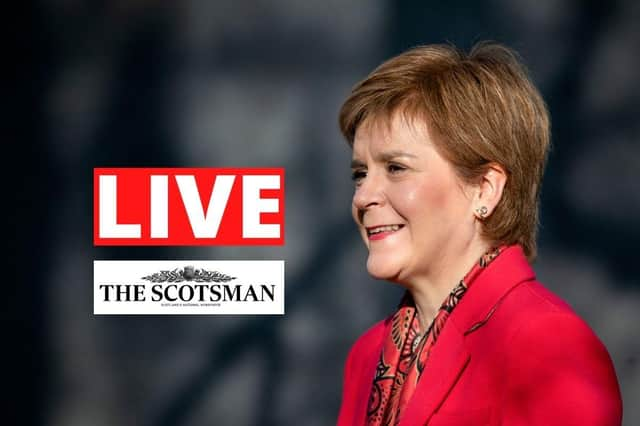Scotland Level 1 announcement RECAP: Nicola Sturgeon announces Glasgow lockdown rules change | Edinburgh remains in Level 2 | Full list of areas by level | What does Level 1 mean | Third wave concerns | FM statement in full


Scroll down to see how coverage of Nicola Sturgeon’s coronavirus levels update unfolded.
Coronavirus in Scotland RECAP: The latest updates on Tuesday, June 1
Key Events
- Glasgow will move down to Level 2
- Scotland records no covid deaths and 478 cases on Tuesday
- Majority of Central belt will remain in Level 2 restrictions
- Share Covid jabs with poorer nations, world leaders urged
A leading scientific adviser to the Government has repeated calls to delay the June 21 lifting of restrictions by “a few weeks”, warning the coronavirus’s ability to adapt in the face of vaccines has still left the UK in a vulnerable position.
Professor Ravi Gupta, a member of the New and Emerging Respiratory Virus Threats Advisory Group (Nervtag), said the increased socialisation which has followed last month’s phase of restriction lifting could be expected to lead to “quite a lot” of hospital admissions.
He said while the nation had performed “amazingly well” in its vaccination programme, it was still too early “to put the vaccine straight up against the virus”.
Prof Gupta said a delay of a few weeks to the June 21 target could have a significant impact on Britain’s battle against the pandemic, and recommended it should be made clear to the public that it would be a temporary measure based on recent events, chiefly the emergence of the Indian or B.1.617.2 strain of the virus.
“Even a month delay could have a big impact on the eventual outcome of this,” Prof Gupta told ITV’s Good Morning Britain.


Covid-19 variants will be named after letters of the Greek alphabet to avoid stigma
Covid-19 variants will be named after letters of the Greek alphabet to avoid “stigmatising” the countries where they were first detected.
Scientist urges delay to June 21 target date for lifting Covid-19 restrictions
A scientific adviser to the Government has repeated calls to delay the June 21 lifting of pandemic restrictions by “a few weeks”, warning that the ability of coronavirus to adapt in the face of vaccines has still left the UK in a vulnerable position.
Professor Ravi Gupta, a member of the New and Emerging Respiratory Virus Threats Advisory Group (Nervtag), said the UK’s pandemic picture had changed since its road map to recovery was drawn up, chiefly through the emergence of the Indian of B1617.2 strain of the virus.
He also warned the increased socialisation following last month’s easing of restrictions could lead to “quite a lot” of hospital admissions, and said while Britain had performed “amazingly well” in its vaccination programme, it was still too early “to put the vaccine straight up against the virus”.
Prof Gupta told ITV’s Good Morning Britain moving back the June 21 target date could have a significant impact on the fight against the pandemic, adding it should be made clear to the public this would be a temporary measure based on recent developments.
More than 39 million people have been given a first jab and a further 25.3 million have had both doses.
Asked whether a three-week delay to the June 21 target would be sufficient while Britons were being vaccinated at a rate of four million per week, Prof Gupta said: “Even a month delay could have a big impact on the eventual outcome of this.
“As long as it’s clear to people this is not an unlimited extension of the lockdown but actually just a reassessment, that would be realistic.
“Because we didn’t plan for the 617.2 variant when the initial road map was made, and actually things have gone really well except for the fact that we have this new variant to complicate things.
“We must remember this is a virus that does adapt, and faced with vaccines it will eventually start to make mutations to avoid them even further, and then we could be in an even more precarious situation after that.”
Prof Gupta said the UK was in “a really good position” in regard to its vaccination programme but caution remained crucial.
“The key thing here is that we’re almost there,” he said.
The EU’s ambassador to the UK has raised hopes that those wanting to holiday in Europe later this summer will find the process easier.
Joao Vale de Almeida told BBC Radio 4’s Today programme: “I hope many, many British citizens will come to our countries and I hope many EU citizens will visit the UK.”
He said that the bloc was hoping a digital Covid certificate would pave the way for greater ability to travel.
“We’re hopeful that some time later in the summer, around July, we could be in a situation where travel and tourism will be made a lot easier,” he added.
Former chief scientific adviser to the Government, Professor Sir Mark Walport, said that more data was needed before the final decision could be made about the June 21 easing of restrictions.
“We need to substitute speculation for scientific data that’s the truth of the matter, as everyone has said in the last few days, the situation is very delicately balanced with some three sets of moving parts,” he told BBC Breakfast.
“Firstly we have got a new more transmissible variant, of that there is no doubt, though we don’t know exactly how much more transmissible.
“Secondly, there’s been a change in behaviour following the relaxation of measures on May 17, and the effects of that will just be starting to come through.
“And thirdly, we’ve got a vaccination programme that is very successful, but with a lot of people that still need both their second dose of vaccine and vaccination from scratch.
“I’m afraid that weeks before the Prime Minister has to make the difficult decision it is going to be necessary to bring in the data.”
The Public Health Scotland dashboard is updated each day with the latest available figures on Coronavirus - you can check it here
April saw highest number of operations since pre-pandemic
More operations were carried out in Scottish hospitals during April than in any other month since the coronavirus pandemic began, NHS Scotland figures show.
There were 18,630 scheduled operations throughout Scotland, of which 1,141 (6.1%) were cancelled. A total of 17,489 operations went ahead.
Scheduled surgeries were up 4.9% from March and 447% higher than April 2020 when the vast majority of planned operations were cancelled or postponed to provide the NHS with additional capacity for the pandemic.
But despite the total number of operations that took place in April 2021 reaching the highest figure since the coronavirus outbreak, it is still down by more than a quarter (26%) since February 2020.
Compared to pre-pandemic, April had 9,015 fewer scheduled operations (down 32.6% from February 2020) and 7,675 fewer were carried out once cancellations are taken into account.
The latest figures, published by Public Health Scotland, show 518 operations (2.8%) were cancelled by the hospital for clinical reasons, 252 (1.4%) were cancelled by the hospital due to a lack of capacity or other non-clinical reasons, 319 (1.7%) were cancelled by the patient and 52 (0.3%) were cancelled for other reasons such as fire alarms, patient transport being late or weather-related issues.
By health board, NHS Grampian recorded the highest proportion of cancelled operations, with 8.2% of their 2,115 scheduled surgeries, followed by NHS Lanarkshire (7.4% of 1,309) and NHS Shetland (7.3% of 151).
NHS Western Isles had just 2.7% of their 113 operations result in cancellation, followed by NHS Borders (3.5% of 143) and NHS Tayside (4.8% of 1,297).


Boost for Tartan Army as scientist says evidence of Covid transmission in fan zones ‘relatively modest’
Evidence of transmission of Covid-19 in outdoor settings such as fan zones is “relatively modest”, a leading scientist has said.


Here is everything you need to know about level 1 restrictions ahead of Nicola Sturgeons announcement
Here’s everything you need to know about level one coronavirus restrictions ahead of Nicola Sturgeon announcing whether the next stage of lockdown easing will go ahead next week.